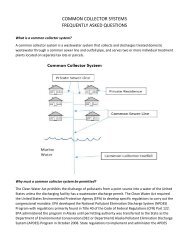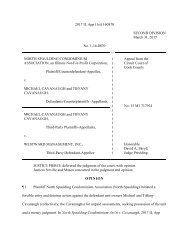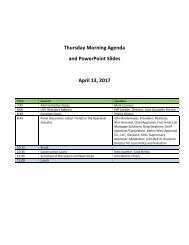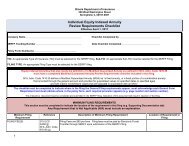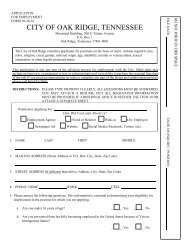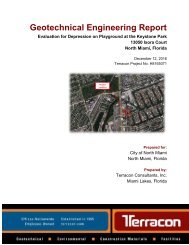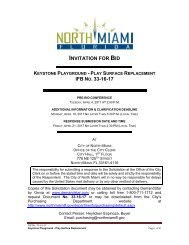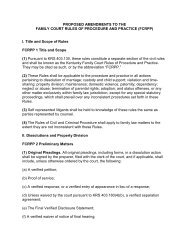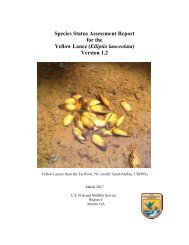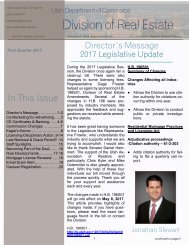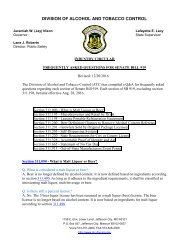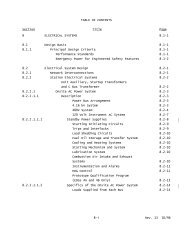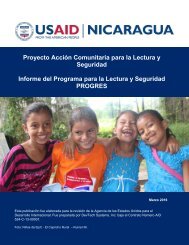Gender Integration
pbaae696
pbaae696
Create successful ePaper yourself
Turn your PDF publications into a flip-book with our unique Google optimized e-Paper software.
National Human Rights Institutions (NHRIs)<br />
and Competent Authorities for Human Rights<br />
International Coordinating Committee of National Institutions<br />
for the Promotion and Protection of Human Rights (ICC).<br />
Global Directory of NHRIs http://nhri.ohchr.org/EN/Contact/<br />
NHRIs/Pages/Global.aspx This site links to NHRIs around the<br />
world. In turn, the websites of individual NHRIs often link to<br />
their human rights reports and recommendations.<br />
Human Rights Defenders and Organizations<br />
that Protect and Promote Human Rights<br />
African Women’s Development and Communication<br />
Network (FEMNET). http://femnet.co/. FEMNET is a<br />
pan-African network of national women’s networks,<br />
consortia, and umbrella organizations in over 30 countries<br />
in Africa to advance African women’s development, equality,<br />
and other human rights.<br />
Asia Pacific Forum on Women, Law and Development<br />
(APWLD). http://apwld.org/. The 180 members of APWLD<br />
represent groups of diverse women from 25 countries in<br />
the region.<br />
Association for Women’s Rights in Development (AWID).<br />
http://www.awid.org/. AWID is one of the larger international,<br />
feminist, membership organizations and is committed to<br />
achieving gender equality, sustainable development, and<br />
women’s human rights.<br />
International Indigenous Women’s Forum/Foro Internacional<br />
de Mujeres Indígenas. http://www.fimi-iiwf.org/ Best known<br />
by its Spanish initials, FIMI is a network of Indigenous women<br />
leaders from Asia, Africa, and the Americas.<br />
International Network of Women with Disabilities<br />
(INWWD). http://www.internationaldisabilityalliance.org/<br />
en/international-network-women-disabilities INWWD is<br />
comprised of about 200 women from international, regional,<br />
national or local organizations, groups or networks of women<br />
with disabilities, as well as individual women with disabilities<br />
and their allies.<br />
Latin American and Caribbean Committee for the Defense<br />
of Women’s Rights (CLADEM). www.cladem.org (website in<br />
Spanish). CLADEM is a network of women’s organizations and<br />
individuals united to achieve the effective defense of women’s<br />
rights in Latin America and the Caribbean.<br />
OutRight Action International formerly known as the<br />
International Gay and Lesbian Human Rights Commission<br />
(IGLHRC). http://iglhrc.org/<br />
Promundo. http://promundoglobal.org/ Promundo works globally<br />
with men and boys to transform harmful gender norms<br />
and unequal power dynamics, believing that redefining what it<br />
means to be a man is critical to achieving gender equality and<br />
ensuring human rights, including freedom from violence.<br />
Women Human Rights Defenders International Coalition<br />
(WHRDIC). http://www.defendingwomen-defendingrights.org<br />
/about/ WHRDIC is a global network of 32 organizations<br />
working to defend those defending human rights.<br />
Women Living under Muslim Laws (WLUML).<br />
www.wluml.org WLUML is an international solidarity network<br />
that provides information, support and a collective space for<br />
women whose lives are shaped, conditioned or governed<br />
by laws and customs said to derive from Islam. The network<br />
demands for women’s equality and their rights, especially in<br />
Muslim contexts.<br />
Human Rights Issues and the Record on Human<br />
Rights Protection<br />
United States Department of State. Trafficking in<br />
Persons Report. http://www.state.gov/j/tip/rls/tiprpt/<br />
USAID and UNDP. 2014. Being LGBT in Asia.<br />
http://www.asia-pacific.undp.org/content/rbap/en/home/<br />
operations/projects/overview/being-lgbt-in-asia.html<br />
Banda, Fareda and Christine Chinkin. 2004. <strong>Gender</strong>, Minorities<br />
and Indigenous Peoples. London: Minority Rights Group<br />
International. Available at http://minorityrights.org/publications<br />
/gender-minorities-and-indigenous-peoples-august-2004/<br />
De Silva de Alwis, Rangita. 2008. Disability Rights, <strong>Gender</strong>,<br />
and Development: A Resource Tool for Action. Wellesley,<br />
MA: Wellesley Centers for Women, with the Secretariat for<br />
the Convention on the Rights of Persons with Disabilities of<br />
the Department of Economic and Social Affairs, and UNFPA.<br />
Available at http://www.un.org/disabilities/documents/<br />
Publication/UNWCW%20MANUAL.pdf<br />
22 USAID | <strong>Gender</strong> <strong>Integration</strong> in Democracy, Human Rights, and Governance (DRG) Programming Toolkit



